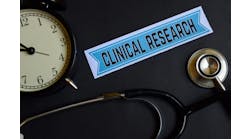A new research program based at the University of Michigan is seeking to discover, translate and implement innovative therapies focused on preventing brain damage caused by cardiac arrest. The Michigan Resuscitation Innovation and Science Enterprise (M-RISE) is funded by the American Heart Association and is a part of its Arrhythmias and Sudden Cardiac Death Strategically Focused Research Network, which works to support researchers leading new approaches to studying arrhythmias and sudden cardiac death.
For the more than 350,000 Americans that experience an out-of-hospital cardiac arrest each year, fewer than 1 in 10 of those treated will survive with good neurologic function.
"Survival for these patients decreases with every minute there is a delay in therapy," said Robert Neumar, M.D., Ph.D., leader of the program and a professor and chair of emergency medicine at Michigan Medicine, in a release from the University of Michigan. "Many patients who have their heart restarted will subsequently die from severe brain damage, and many who do survive to hospital discharge do not return to their pre-arrest function due to brain injury. M-RISE was designed to advance the AHA mission of being a relentless force for a world of longer, healthier lives,"
M-RISE will be housed at Michigan Medicine under the Michigan Center for Integrative Research in Critical Care (MCIRCC), which works to transform critical care through innovation, integration and entrepreneurship. M-RISE's strategy is based on four guiding principles:
• Restoring blood flow as soon as possible following cardiac arrest with early CPR and defibrillation is the most effective strategy for preventing brain damage caused by cardiac arrest.
• Neuroprotective therapies are most effective when delivered within minutes after a cardiac arrest has occurred.
• Neuroprotective therapies that can be delivered by bystanders and first responders will have the greatest potential to prevent brain damage after an out-of-hospital cardiac arrest.
• Successful clinical trials demonstrating neuroprotective therapies that can be delivered by bystanders and first responders to out-of-hospital cardiac arrest patients can be implemented as safe and easy-to-use therapies with minimal to no prior training for bystanders.
Neumar said MRISE is focusing on early treatments delivered by bystanders and first responders, which will have the greatest therapeutic benefits for cardiac arrest patients.
M-RISE includes three projects, a postdoctoral training program and an institution collaborator. The three research projects are divided into a basic, clinical and population science focus and build upon work performed in the previous project — a translation research model, according to the program.
The basic science project will be led by Tom Sanderson, Ph.D., an associate professor of emergency medicine and molecular and integrative physiology at Michigan Medicine. Sanderson and team will study neuroprotective agents that can be given intranasal and intramuscularly during cardiac arrest in animal models. They hope to determine the lowest doses that achieve the maximum treatment effect when given during CPR and how timing of the administration impacts neuroprotective effects.
Next, Robert Silbergleit, M.D., a professor of emergency medicine at Michigan Medicine, will work with the U.S. Food and Drug Administration to determine a regulatory pathway for a future trial of bystander and first responders administering intranasal neuroprotective agents to those suffering an out-of-hospital cardiac arrest. The team will work with Sanderson's team to use its preclinical data when developing an application for an investigational new drug.
The third project will be led by Brahmajee Nallamothu, M.D., M.P.H., a professor of cardiovascular medicine at Michigan Medicine, who will work with the University of Michigan Medical School Department of Learning Health Sciences, the U-M Clinical Simulation Center and the Washtenaw-Livingston County Learning Health System, and their stakeholders, to identify barriers and facilitators to shortening time to treatment during out-of-hospital cardiac arrest. The groups will first use a learning health system approach to optimize time to CPR and defibrillation and then use this infrastructure, along with simulation-based training and assessment, to inform implementation strategies for early intranasal and intramuscular therapies.
The research teams will also work with Oakland University, in a populous urban county in Michigan, to grow its medical research program focused on resuscitation science. Robert Swor, D.O., a professor of emergency medicine at Oakland University William Beaumont School of Medicine, will help foster collaboration between the universities within the research program.

